In recent years, the number of people using soup kitchens has increased dramatically, a soup kitchen and charity in West London is taking a unique and pioneering approach to help those in need.
Based in the London borough of Hammersmith and Fulham, The Upper Room’s approach is unlike any other in its vicinity. Going beyond providing nourishing meals to those in need, it offers a multi-faceted approach to address the complex challenges faced by individuals experiencing homelessness and poverty. Through a unique combination of four strands which includes meals, counselling, job guidance, and driving lessons, The Upper Room is redefining what it means to serve those who seek assistance.

Established in 1990 the charity rapidly expanded from a small soup kitchen supporting the local homeless community into a dynamic charity offering a range of services to address both the immediate and longer-term needs of those impacted by homelessness and poverty.
At the heart of The Upper Room’s philosophy lies the belief that a holistic approach is essential for empowering individuals to break the cycle of poverty and homelessness. Ashley Robinson, dedicated manager of The Upper Room, emphasises this multi-faceted approach: “We wanted to create an environment that not only provides a warm meal but also supports people in reclaiming their lives.”
With enough staff to focus on all individuals and their precise needs, Ashley is committed in giving aid to all clients and understands exactly what they require to move forward with their lives: “Our services are personalised, and we pride ourselves on finding innovative solutions to meet the needs of our beneficiaries, I always say no request is too much when it comes to people’s ability to survive.”

The foundation of this unique initiative is, of course, the food. The Upper Room serves nutritious meals to hundreds of individuals every day, with no limit on how many meals each guest can have, meals here are significantly different to what might be expected in a regular soup kitchen. Recently appointed head chef Jude Thompson is determined to provide healthy, nutritious, fresh food prepared daily on site: “My idea is to give good food, not just give two pots of slot and expect them to accept that. Because health wise, you’ve got to give for your mind and body. Physically, they need good food, they do appreciate it. And mentally that will help them.”
The charity particulalry prides itself on welcoming guests from all walks of life with different backgrounds and experiences, Thompson said: “You get a fantastic response from the people here, people forget they’re human beings. They would come and talk to me and you think whoa, hang on a second, you haven’t been homeless all your life, that you’ve had a life, you’ve had a job, you’ve had this, they come and discuss food with you, which is an amazing thing. It is very rewarding.”
However, food alone is not enough to address the root causes of homelessness and poverty. That’s where the additional services come in. One of the distinctive features of The Upper Room is its on-site counselling services. Trained professionals offer individual and group counselling sessions to address mental health issues, substance abuse, and trauma experienced by guests. Robinson explains, “We aim to provide a safe space where people can heal from their past and gain the confidence to rebuild their lives.”
Going even further by offering job opportunities to its guests, the charity collaborates with local businesses, encouraging them to consider hiring individuals who have received support from the soup kitchen. This initiative not only provides immediate income but also fosters a sense of purpose and dignity. Robinson states, “By connecting our guests with employment, we help them regain independence and take ownership of their lives.”
Driving lessons are another unique offering at The Upper Room. Recognising that lack of transportation can be a significant barrier to employment and stability, the organisation provides driving lessons to interested guests. “Transportation can be a game-changer in the journey towards self-sufficiency,” said Robinson. By empowering individuals with the ability to drive, The Upper Room opens doors to job opportunities that were previously out of reach.
The impact of The Upper Room’s multi-faceted approach is evident in the stories of transformation that unfold among clients. Former guests who once relied on the soup kitchen’s services have found employment, stability, and a renewed sense of purpose. Sarah Turner, a beneficiary of The Upper Room, shared her experience: “They not only gave me a warm meal when I was hungry, but they helped me heal from past traumas and provided me with the skills to find a job. Now, I have a stable income and a brighter future ahead.”
Looking ahead, The Upper Room aims to expand its reach and impact even more lives. Robinson expressed his vision, “We want to create a network of support that extends beyond the soup kitchen. By forging partnerships with more organisations, we can offer additional services such as housing assistance and healthcare.”
The Upper Room stands as a shining example of a soup kitchen that goes beyond the conventional definition of charity. Through its multi-faceted approach of providing meals, counselling, job opportunities, and driving lessons, it offers a comprehensive pathway towards empowerment and self-sufficiency.
The dedication of Ashley Robinson and his team has created an environment where individuals are not just fed but also supported, guided, and equipped with the tools to rebuild their lives. The Upper Room is a testament to the transformative power of compassion and a beacon of hope in its community that does well to inspire other organisations to imitate its procedures for the benefit of all those in need.





















